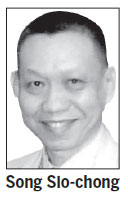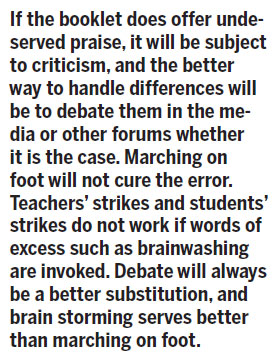Students should know their own country
Updated: 2012-08-02 06:51
By Song Sio Chong(HK Edition)
|
|||||||||

Despite the hot weather in the afternoon of July 29, 19,000 people began marching to protest the planned implementation of national education, according to police reports. The march began at 3 pm from Victoria Park, bound for the Tamar government headquarters at Admiralty. At its peak, the number of marchers was estimated as high as 32,000.
Among the protesters, there were teachers, parents, and students. During the consultation period for national education, few appeared to hold a truculent attitude to the introduction of the program in primary schools in September. Now it seems people have changed their minds. The reason of this irrational sentiment arises from a national education booklet, called China Model: National Condition Teaching Handbook. Some pointed to that document and claimed to have found the seeds of political indoctrination in disguise. The booklet uses a few sentences to paint a rosy picture of the Communist Party without mention of the good points of the US two-party system, or the multiple-party systems of Western Europe.
It seems rather strange to me that one paragraph or several sentences in a reference booklet should derail a government policy to promote national education. It is not necessary to stop eating for fear of choking, as a Chinese proverb runs. In an election year, any irrational behavior may erupt and seize the popular imagination.
As far as we know, the policy remains that national education will be voluntary in primary schools after the new semester begins in September. After three years of experience with trial and error, the subject will become compulsory in 2015 for primary schools and for secondary schools a year later. Before it becomes compulsory, the teaching materials including the so called "China model" may be subjected to improvement, modification or even change with more germane content.
As to the content commenting on political systems, our own and others, teachers who use the booklet may use their own discretion as to whether to adopt or adjust the points made in the booklet. Similar to the writer of the booklet, the teachers of national education may have academic freedom to express, according to the fact and their beliefs. Regardless of whether it is written in a teaching booklet or not, teachers may disagree, raise argument and ask the education bureau to make necessary amendments. The calling of a teachers' strike and a students' strike simply sound premature, implausible, demagogic or at least not proportional.

Furthermore, it will also be difficult to explain to our children, now or when they grow up, why they should protest over a few complimentary words about the Communist Party. If the booklet does offer undeserved praise, it will be subject to criticism, and the better way to handle differences will be to debate them in the media or other forums whether it is the case. Marching on foot will not cure the error. Teachers' strikes and students' strikes do not work if words of excess such as brainwashing are invoked. Debate will always be a better substitution, and brain storming serves better than marching on foot.
In fact, "China model" is not a lurid phrase; it merely describes the diversification of different development in the world. Forty years ago, Hong Kong together with South Korea, Taiwan and Singapore, under the influence of Confucian culture, were called "the four dragons of Asia" for they had paved their own model of development. Notwithstanding that, both Hong Kong and Macao have been under similar "One Country, Two Systems". There are eponymous models of Hong Kong and Macao in academic circles because of differences between the two political structures. In China, the political party system is not called a one-party system, but rather a multi-party cooperation and a political consultation system under the leadership of the Communist Party. In relation to the two-party or multi-party systems commonly seen in other areas of the world, the Chinese system has both advantages and disadvantage, the same as its western counterparts. Notwithstanding that no political systems in the world are perfect, it is up to the Chinese people, and Chinese people alone, to decide whether such system works, or works well. Diversification of political systems should be respected; conflict of cultures is not uncommon. Under the "One Country, Two Systems", Hong Kong should also respect the political systems operated on the mainland. Without such respect, there will be no "One Country" upon which our "Two Systems" had been based.
I believe Hong Kong people are the least aware of their country, when compared to other parts of China. That may be attributed to British colonization. Hong Kong people confuse their identity as to whether they are Chinese, Hong Kong Chinese, Chinese Hongkongers, or Hongkongers. That is why national education here is so badly needed. Without a sense of belonging to the HKSAR of PRC, social harmony in Hong Kong will simply be not achievable.
Instead of brain washing as the opposition has usually called it, I refer to national education as mental sanitation. Our students' or citizens' affection towards their motherland should not be equated to blind love for the ruling Party. We should, however, realize that China's achievements since adoption of the open policy can not be separated from the leadership of the Communist Party and the State Council. Therefore it is nothing wrong to respect such leadership so long as it does work well for Chinese development and the livelihood of Chinese People.
The author is a current affairs commentator.
(HK Edition 08/02/2012 page3)